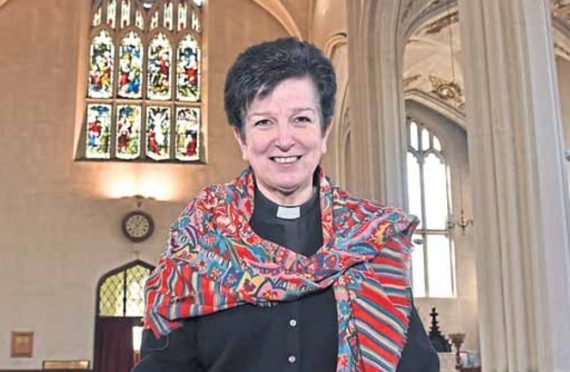
One year on from becoming Scotland’s first female bishop, Anne Dyer has a stark revelation to make – she was the victim of gender-based bullying.
Today, in the run-up to the first anniversary of her inauguration as Bishop of Aberdeen and Orkney on Friday, she is backing an international campaign to put an end to the intimidation and violence suffered by women and girls.
And she says her own painful early experiences as part of the Church of England make her better able to take on the challenge and support victims in Scotland.
The married mum of a grown-up daughter has spent part of the winter working with other agencies, like The Citadel in Aberdeen, meeting victims, hearing their stories and speaking out on their behalf.
Later this year she and her churches, like others, will take part in 16 days of activism that follows the United Nations’ International Day for the Elimination of Violence Against Women.
“This has been one of the most exciting years, certainly of my ministry, but maybe in my life,” she says of her first year in her new post. “I have met the most wonderful, friendly folk up here; both in Aberdeen and in my churches.
“There is almost a delight that the church has made a woman the bishop. When I am on the bus and in shops and people stop me and say ‘it’s great to have a woman.’ But there are also questions around whether that makes any difference. I think it does because I have different priorities.”
And the abuse of women at home, on the street and in the workplace is right up there.
She says: “I have been bullied in life. I think when you have contexts where men are in the majority and have all the power, then it can become quite easy for particular men who are maybe anxious about their power and themselves to over-exert themselves, and to bully.
“If you have less power and less position then you put up with it as a woman, because you don’t want to cause trouble and you might not want to lose your job or a promotion. In this last year we have seen a lot of that in the #MeToo movement because women are finally finding their voices and collectively we’re speaking out.
“I would be surprised if there was any woman who has not had that experience in their life. That does not mean that all men are bullies, but in a hierarchical world where men have traditionally held power, it is more often that men are bullies, and that’s what you see in gender based violence. When you look at violence against the body – murders in family, rape – the victims are usually women.”
Despite a protest against her appointment by seven of the diocese’s 14 priests, she says her time in Scotland – though not without challenge – has been bully-free.
But she reveals: “I had quite a different experience in England. It was a very difficult Church environment. There were men who weren’t prepared to drink a cup of coffee with me, or walk in a Church procession with me, or sit with me, because I was a woman.
“When I was principal of a theological college there were male students who would refuse to take communion from me and would sometimes do it in a way that was offensive and difficult to deal with. I had to put up with it because that’s how it was. But one of the things that has happened for me over the last 10 to 15 years is I have grown in confidence to know what bullying looks like and to have sufficient self-esteem and confidence in myself to call it out.
“That is part of what I bring as a bishop; that I am in a confident place and because it is not my personal experience now, I need to be an advocate for others. That’s important for me. I know what it is like to be fearful and feel powerless and the vulnerability that comes with that.”
The bishop, a champion of inclusion who supports same-sex marriages and is launching an initiative next month to encourage her congregations to make their churches more accessible to people with dementia and other disability – adds: “We need to be working hard to help all people, men and women. We need to treat each other with respect and care.”

Enjoy the convenience of having The Sunday Post delivered as a digital ePaper straight to your smartphone, tablet or computer.
Subscribe for only £5.49 a month and enjoy all the benefits of the printed paper as a digital replica.
Subscribe